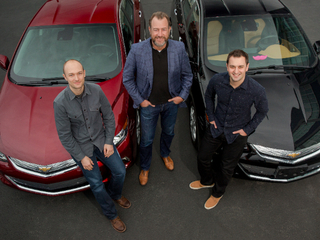More and more, giant automakers are teaming up with smaller (but rapidly growing) tech startups focused on ridesharing and ride-hailing.
Before we had any time to process Volkswagen’s new investment in Gett, Toyota announced this week that it had made a strategic investment in Uber.
The investment, which is reportedly less than $100 million, is the third high-profile partnership this year of this kind. For me, the trend clearly demonstrates that even the most established automakers understand that the times are changing. In a decade or two, sales of cars to individuals may plummet, or maybe disappear entirely. Meanwhile, a bevy of tech companies are rising to help drive that trend and provide a “mobility” alternative.
Here’s a summary of those companies and their automaker partners.

Uber
- Total raised: Over $8 billion
- Valuation: $62.5 billion
- Automaker partner: Toyota (announced May 24, 2016)
- Amount partner invested: Under $100 million (reportedly)
With a warchest already in the multiple billions, Uber probably won’t notice Toyota’s investment, so it seems somewhat clear that the announcement is more about the partnership. The press release proclaims that the two have “entered a memorandum of understanding (MOU) to explore collaboration.”
That is, they don’t have many details to share at this point.
In his prepared quote, Emil Michael, chief business officer of Uber, points out that Toyota cars are “among the most popular” on the Uber platform. It’s probably also the most popular on Lyft’s platform, since Toyota makes the wildly-popular Prius, a hybrid electric vehicle that counts among the most fuel-efficient ever brought to market. In other words, it helps drivers save on gas money.
Separate from its new partnership with Toyota, Uber announced last week that it was deploying self-driving cars on the streets of Pittsburgh in order to collect mapping data as well as to test the cars’ self-driving capabilities. Interestingly, the company’s program was using a hybrid Ford Fusion, outfitted radars, laser scanners, and high-resolution cameras. One question would be whether Uber has another existing relationship with Ford, or if the choice of car was simply a decision made by the team at Uber’s Advanced Technologies Center.
Lyft
- Total raised: Over $2 billion
- Valuation: $5.5 billion
- Automaker partner: General Motors (announced January 4, 2016)
- Amount partner invested: $500 million in a $1 billion Series F round
At the beginning of the year, GM contributed $500 million to a $1 billion funding round secured by Lyft. Though barely six months old, Lyft’s partnership with GM is the longest-standing on this list, which explains why the two companies have already executed on a couple tangible measures.
The first came in March, when the two launched Express Drive, a car rental program for individuals that need access to cars in order to drive for Lyft. Naturally, the program offers the Buick Regal and several Chevrolet models (Equinox, Impala, and Malibu)—vehicles manufactured by GM.
Additionally, there are reports that Lyft and GM are planning to test self-driving electric cars on city streets sometime this year, though neither company has confirmed this.
On that note, it’s worth noting that GM isn’t banking on Lyft being the only technology company it needs to succeed in the ongoing transportation revolution. In March, the company purchased Cruise Automation, a technology company that had developed kits to turn cars like the Audi S4 or A4 into self-driving vehicles. The acquisition reportedly cost GM over $1 billion.
Gett
- Total raised: $520 million
- Valuation: Unknown ($575 million in November 2015)
- Automaker partner: Volkswagen (announced May 24, 2016)
- Amount partner invested: $300 million
Even for those who have heard of Uber and Lyft, Gett will likely be an unfamiliar name. As you can gather by its former name Get Taxi, this company doesn’t exactly provide ridesharing in the Uber or Lyft sense where a stranger gives you rides in their personal car. Rather, it’s more similar to Uber’s black car service or Flywheel, which connects you with registered taxis.
Still, for a company that has essentially bet on the declining taxi industry, Gett seems to have attracted some bullish investors. This week, the German auto giant Volkswagen joined the fray by investing $300 million in Gett. As with the Uber-Toyota partnership, the deal is too new for any specific details to be shared.
Today, Gett says it’s currently live in 60 cities worldwide, including London, Moscow, Tel Aviv, and New York City.























